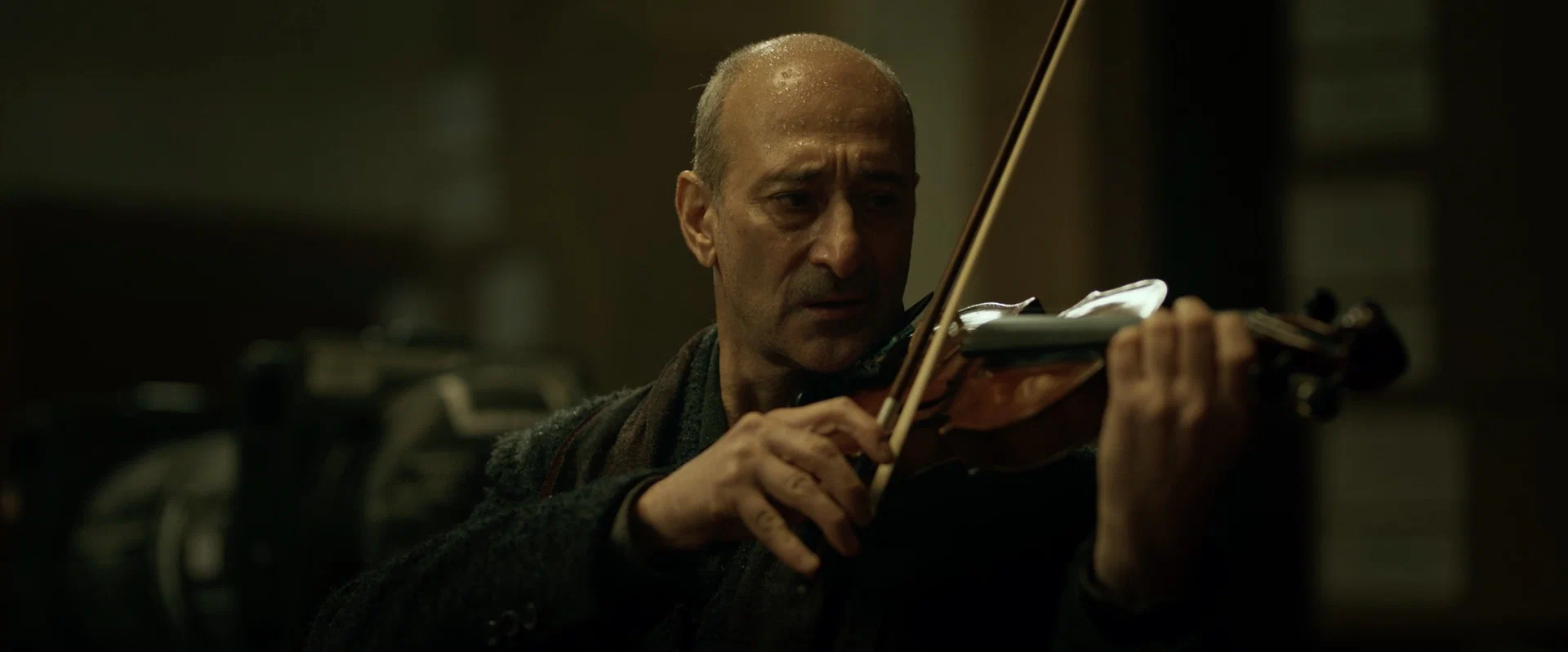The Witness
A failed Russian propaganda movie reveals a disturbing truth
Uriya Shavit

The Guardian recently reported on the failure of a new Russian propaganda feature movie, “The Witness.” It premiered in mid-August and turned out to be a box-office flop, revealing that Russians have little appetite for the lies of their regime.
“The Witness” tells the story of an esteemed fictional Belgian violinist named Daniel Cohen, a citizen of the world, who arrives in Kyiv in February 2022, days before the Russian invasion. He gets caught up in the fighting and witnesses a series of “inhuman crimes and bloody provocations by Ukrainian nationalists.”
According to the report, at one point, a Ukrainian commander is seen walking around with a copy of Mein Kampf while other Ukrainian soldiers pledge their allegiance to Adolf Hitler. As a witness to these unspeakable horrors, Cohen sets out to tell the world the “truth” about the conflict.
Vladimir Zelensky became Ukraine’s president following the success of a comical television series about an obscure schoolteacher who becomes president. In democracies, art inspires politics. In tyrannies, politics controls art.
Writing about the prospects of “The Witness,” Time Magazine noted that “sociologists say the public interest in following the war has waned, and people these days mainly want to escape from the gloom and doom of news from Ukraine.” Indeed, Russians largely fail to realize that they are not the victims here and that, ultimately, they will pay a price, too.
If war-mongering propaganda movies with a Daniel Cohen as their main character ring alarm bells in your head, then you have studied history.
Since the start of the Russian invasion, comparisons between the Nazi regime and Putin’s have been commonplace. A poster of Putin alongside Hitler is popular in several European capitals.
Analogies to Nazism and its crimes should be treated cautiously to avoid trivialization. Yet they are essential if we want to explain how precisely Nazism was exceptional and draw lessons for the present and the future.
Putin’s agenda echoes the shadows of Nazism on several crucial points.
Hitler sought at first to reunite German minorities with the homeland and erase the humiliation of the First World War. Putin seeks to do the same for Russians and erase what he sees as the Russian humiliation at the end of the Cold War.
It was easy for some Western elites to advance appeasement in the 1930s in part because Hitler’s early diplomatic crusades and ultimatums could be framed as concern for minority rights and for minimal national dignity.
Some in the West have been making the same mistake with regard to Putin’s demands and constant whining since 2014. At present, the Russian dictator’s only hope to end the Ukraine fiasco triumphant is for a Charles Lindbergh to become US president. Reading the latest polls by what the numbers rather than common sense say, there is a good chance Putin will get what he wants.
Hitler thrived on populist distaste for liberalism, modernism, and internationalism, and a yearning for romantic, primordial vitality. So does Putin. Hitler exhibited total disregard for human life and international law. So does Putin. For Hitler, truth meant nothing. Same for Putin.
The main difference between Nazism and Putinism is that Hitler’s ideology was grounded in the belief that Jews are an absolute evil, that they are leading a global conspiracy against the German people, and, ultimately, that they must be exterminated.
Irrational antisemitism defined Nazi fascism, rather than just served as a mobilizing tool.
The most terrifying aspect of Hitler’s strategic actions was how much they were driven by the lunatic dehumanization of Jews that was at the center of his worldview. That is what made Hitler unique compared to other dictators and largely led to his downfall.
In contrast, Putin has been a friend and protector of the Jewish minority in Russia and is not a conscious antisemite.
Yet movies like “The Witness” – could they really not think of a less generic name than Daniel Cohen? – reveal a complicated and disturbing truth.
From day one of the war, Putin has been obsessed with the lie that the aggression was intended to de-Nazify Ukraine: Putin, savior of the Jews, savior of humanism.
The obsession does not wane. Just this month, Putin argued the West installed a Jewish president in Ukraine in order to cover up for the country’s glorification of Nazism. Three months ago, he argued that his many Jewish friends told him Zelensky was not a Jew and accused Ukraine of supporting neo-Nazism.
If you try hard, you can find grains of cynical rationality in Putin’s discourse. Because opposition to antisemitism became a conventional wisdom in Western politics, accusing Ukraine of pro-Nazism could seem as potentially effective legitimizing rhetoric.
It is also understandable why Putin would like to re-live the Russian heroism of the Second World War. The final stages of that war are the most glorious period in Russia’s modern history that witnessed mostly defeats, withdrawals, and support for evil.
Still, no matter how one spins Putin’s obsession with the false claim that his war is a campaign against Nazism, and no matter how one tries to rationalize his obsession with Zelensky’s Jewish identity, an uncomfortable fact remains.
Eight decades after the Second World War, an existential struggle for liberal democracy is taking place in Europe, and once again, the forces of tyranny and falsehood base their aggression on a fictitious narrative that has Jews at its core.
